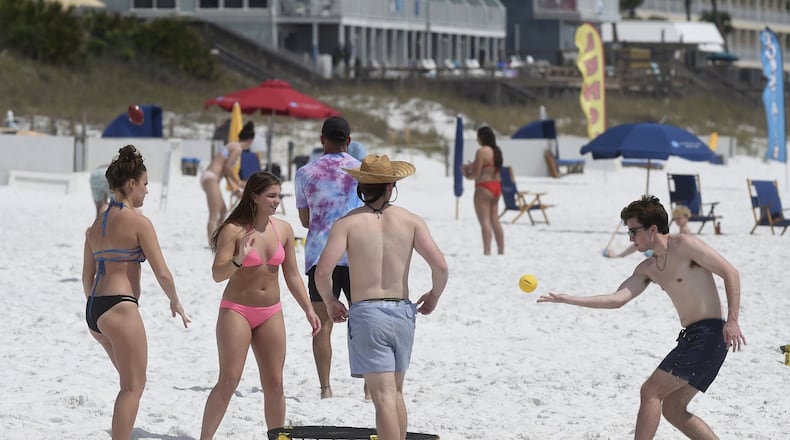Within a couple of weeks, metro Atlanta parents will have to figure out what to do with their kids for spring break.
With every public school building shuttered and children doing worksheets or teacher teleconferencing at home, school is kind of out already. But many parents who scheduled time off from work long ago still hope to escape the stress of a national emergency if that is still possible.
Airliners are grounded, cruise ships are anchored, restaurants are closed and even public beaches are being roped off. Floridians are reacting to hordes of college students who flocked there, appearing nonchalant about the pandemic. "If I get corona, I get corona," one of them said on camera on a crowded Miami street.
Such insouciance may be hard to fathom for parents who have been cooped up with restless kids, their bosses and colleagues constantly pinging as they try to ignore the pandemic news. The death toll mounts, cities lock down and people dream of getting away somehow.
“I do hope some of this is going to ease up before spring break,” said an ever-hopeful Shauna Young, a mother in Gwinnett County. “I don’t think it’s going to happen,” she added. Just two weeks ago, she was looking forward to a Caribbean cruise with her husband and teenage son.
When the cruise line canceled, it upset her so much she considered writing the CEO. It seemed an overreaction.
Then on Thursday, she took her 16-year-old son to the pediatrician for his seasonal visit. He has asthma, and flareups can come with the spring pollen. The doctor, whom she has trusted for two decades, explained that this is worse than the flu and that there is no vaccine.
“She definitely opened my eyes,” Young said. Now, unwilling to risk a hotel, she may take the family to her daughter’s house in Daytona Beach.
Popular destinations for Atlantans have experienced a similar change of heart.
Just last week, David Demarest, a tourism official in the Florida Panhandle, was upbeat about business.
>>CORONAVIRUS COVERAGE: all the news in one place
>>RELATED: Hotel bookings plunge in Georgia triggers job cuts, steep losses
>>ALSO: Georgians caught abroad as world reacts to pandemic
In Walton County, home to Rosemary Beach, Seaside and Grayton Beach — nicknamed “30A” after the lazy highway that connects them — more than a fifth of the residents depend on tourism, he said. He thought the area would actually benefit from the pandemic, as destinations in Europe shut down. The area gets a lot of repeat business from Atlanta, and he figured the familiarity, plus the ability to get there by car rather than plane would be attractive.
By late this week, when tourism on 30A surged as students and families in the region enjoyed extended spring breaks, Demarest was dejected.
The Walton County Commission decided Thursday to close the beaches. There is just one hospital nearby, and a small one at that, said Demarest, spokesman for Visit South Walton.
“If you had a lot of people here become sick,” he said, “it would be a lot easier to overwhelm our medical infrastructure.”
Beaches in neighboring Florida communities closed, too, as did several along the Georgia coast. Starting Saturday, Glynn County beaches, including St. Simons Island, Jekyll Island and Sea Island’s Beach Club, are off limits through April 13.
The party is pretty much over in nearby Savannah, too. Just last week, everyone was looking forward to the annual St. Patrick’s Day celebration this week.
They had to cancel it.
Hotels are open but restaurants are closing, or shifting to to-go boxes.
“Given the current situation, the reality is there will be affordable rates throughout the city,” said Joseph Marinelli, president of Visit Savannah, the local chamber’s tourism arm.
Few tried as hard to salvage spring break as Lori Brennan, a mother of two teenage boys in Fulton County.
She worked with her neighbor for a year on a meticulously planned trip to Italy, that included Venice, Florence and a villa outside Rome.
“It was going to be great,” she said.
Great, until the country was overrun by the virus. Brennan wasn’t worried about infection, but she didn’t want to vacation in the country during a lockdown.
She shifted her sights to London, even though her neighbor was too afraid to go. She figured if London fell to the coronavirus, they could move on to the mainland, Portugal maybe.
That was before President Donald Trump announced a ban on flights from Europe and then the United Kingdom.
Now, Brennan has booked a cheap flight to Florida, where they’ll be visiting a friend. She’s been reading about the deaths in Italy and how the hospitals ran out of respirators. Now alarmed, she will be bypassing her parents in Orlando, who are in their 70s. COVID-19, the disease caused by the novel coronavirus, has been ruthless with older people and those with underlying medical conditions, such as her mom. Younger people and children have fared better, with typically mild symptoms.
If the flight gets canceled, they will drive. However, with beaches closing across Florida, she wonders whether her sons will want to go.
At least her friend has a pool.
About the Author
Keep Reading
The Latest
Featured



